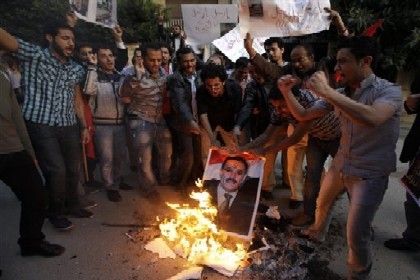46 Dead in Yemen Protest Bloodbath, Saleh Declares Emergency Rule
إقرأ هذا الخبر بالعربية
Beleaguered Yemeni President Ali Abdullah Saleh ordered a state of emergency after regime loyalists on Friday killed at least 46 protesters, according to medics, in the bloodiest clash in weeks of unrest.
Witnesses said pro-Saleh "thugs" had rained bullets from rooftops around a square at Sanaa University, the center of demonstrations against Saleh, adding that more than 400 people were wounded.
An Agence France Presse correspondent saw protesters rush into the surrounding buildings and throw six alleged gunmen from the rooftops.
A 14-year-old boy was shot in the head in front of him.
"We were protesting peacefully and they shot at us. I won't leave this place until the president goes, even if I have to die," said one demonstrator, Ahmad, 25.
The violence drew international condemnation, with U.S. President Barack Obama calling on his key anti-terror ally to live up to a pledge to allow peaceful protests and engage with the opposition.
U.N. human rights expert Christof Heyns said the deadly crackdown was "a clear violation of international law" while Amnesty International blamed snipers for the killings.
The bloodshed brought the death toll to more than 70 since the outbreak of demonstrations calling for Saleh to step down after 32 years in power in late January.
Many of the casualties were taken to a makeshift hospital at the university, where witnesses described bodies lined up with Korans, the Muslim holy book, placed on their chests.
"We cannot take care of the wounded anymore, there are so many of them. We don't have enough supplies," said doctor Wassim al-Qershi, his hands splattered with blood.
Doctors said most of the wounded were shot in the head, neck or chest.
Saleh expressed his "regret" at the bloodshed, describing the victims as "martyrs of democracy" and accusing those responsible of trying to undermine a peace initiative backed by Saudi Arabia.
"What happened today was very regrettable, the death of our children," he added, a week after saying he had ordered his security forces to ensure the safety of protesters.
Saleh denied that police had fired any shots while Interior Minister Mutahar al-Masri said they intervened only after protesters "made several attempts to break into houses."
Parliamentary opposition spokesman Mohammed al-Sabri accused the regime of a "massacre" and said "these killings will not help keep Ali Abdullah Saleh in power."
Thousands of people have camped out in the square since February 21, demanding the departure of Saleh, an autocratic U.S. ally in the war against al-Qaida.
On March 10, Saleh offered to devolve power to parliament under a new constitution and pledged to protect protesters.
Opposition leaders last week called off negotiations with the regime but in the wake of Friday's killings Washington again called for dialogue.
"Those responsible for today's violence must be held accountable," Obama said in a written statement.
"It is more important than ever for all sides to participate in an open and transparent process that addresses the legitimate concerns of the Yemeni people, and provides a peaceful, orderly and democratic path to a stronger and more prosperous nation."
Heyns, the U.N. special rapporteur on extrajudicial executions, condemned Friday's bloodshed.
"Not only are attacks on peaceful demonstrators clearly prohibited, but also abiding by instructions to use excessive force constitutes a clear violation of international law."
Philip Luther, Amnesty's deputy director for the Middle East and North Africa, said: "This appears to have been a sniper attack with security forces deliberately shooting to kill protesters from strategic vantage points."
In the southern city of Aden, a hotbed of unrest even before the wave of protests, tens of thousands of people on Friday attended the funeral of a protester who was killed earlier this week, witnesses said.
"Ali you killer, Ali you slaughterer," their banners read. Mourners chanted: "The people want to overthrow the regime."
Police fired warning shots but there were no reports of clashes.
Yemen is the poorest country on the Arab peninsula, although it produces some 300,000 barrels of crude oil per day, and faces a secessionist campaign and tribal unrest as well as al-Qaida.



